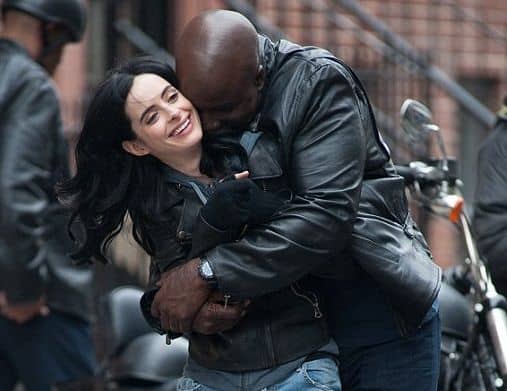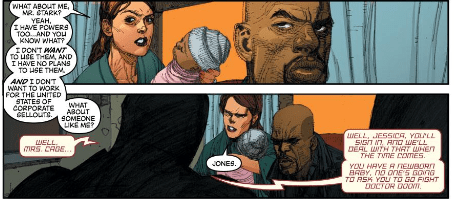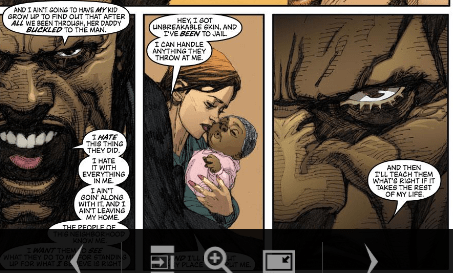*Warning: some spoilers for Jessica Jones Episodes 1-6*
The two biggest events that Marvel fans in general are anticipating is the release of Jessica Jones on Netflix in November 2015 and the release of the epic blockbuster Captain America: Civil War in May 2016. On the surface, this film and TV project look like they have nothing in common besides being set in the same shared universe. Jessica Jones is a character driven, neo-noir story about about a superhero turned private eye, who plays a cat and mouse game with the manipulative Kilgrave (played by David Tennant), a man who used his mind control abilities to make her do horrible things and drove her from the hero business. On the other hand, Captain America: Civil War is a bombastic superhero crossover (Seriously, it has more superheroes than the Avengers.) that pits Iron Man against Captain America in answering the age-old question of freedom vs. security with dozens of heroes, including the debuts of Black Panther and Spider-Man, caught in between.
But, in fact, Jessica Jones and Luke Cage, (Played by Krysten Ritter and Mike Colter respectively.), who share sizzling, occasionally emotional chemistry in the Jessica Jones Netflix TV show, played a pivotal role in the 2006 Civil War crossover that inspired the film. They bring the heightened conflict between American icons and futurists down to ground level showing the human cost of the Superhuman Registration Act and the impact it has on two folks, who happen to have super strength and bulletproof skin, that just want to raise their daughter in peace.
New Avengers #22 (2006), which was written by Jessica Jones co-creator Brian Michael Bendis and drawn by Leinil Yu, tells the very personal story of Luke and Jessica’s resistance against the Superhuman Registration Act. Jessica opposes the act because she doesn’t trust SHIELD and superheroes in general after some dark events in her past involving Killgrave and the Avengers. She also just wants to raise her baby daughter Dani and not have to be a paid employee of the “united states of corporate sellouts”. Luke opposes the act because he doesn’t want to have to hunt down his fellow street level heroes Spider-Man and Daredevil, who wear masks to protect their loved ones from being killed or attacked by their rogues galleries. He also tells Iron Man that this act muddles the ideals that superheroes stand for by pitting them against each other instead of fighting real evil and crime, which Luke deals with on a daily basis as he patrols the streets of Harlem while Tony Stark lives it up in his fancy skyscraper.
Something that Marvel’s Netflix shows Daredevil and Jessica Jones do an excellent job of is subtly referencing the activities of the Avengers (Especially the Chitauri invasion in the first film.) and its cost on ordinary people. In Daredevil, the collateral damage caused by the Avengers and Chitauri allowed unsavory businessmen, like Wilson Fisk and Leland Owsley, to take control over parts of New York City and make huge profits by forcibly and violently evicting low-income housing tenants to make way for their high rises. In the Jessica Jones episode “AKA 99 Friends”, one of Jessica’s clients verbally and physically attacks her because her mother was killed by falling rubble while the Avengers battled the Chitauri despite the fact that Jessica was working horrible temp jobs and day drinking with Trish Walker (Rachael Taylor) while this was going on. While Avengers and Avengers: Age of Ultron focus on superhero team drama and the end of the world, Daredevil and Jessica Jones look at what daily life is like in a world of gods, super soldiers, and miracles, and how their actions affect the average Jane or Joe. And this is something that could make Captain America: Civil War an even more compelling film.
Now, I understand that Captain America: Civil War is chock-full of heroes, and huge dangling plot threads from Age of Ultron and Captain America: Winter Soldier, including the hunt for Bucky Barnes, a new Avengers team, and what Tony Stark is doing with his life now that he’s not an Avenger. But there is still time for a five minute scene where either Jessica Jones or Luke Cage (Preferably both.) reject the Registration Act as Jessica goes to Canada with their baby or by herself, and Luke Cage shrugs off Capekillers with his bulletproof skin in a manner similar to the expertly choreographed bar fight “team-up” sequence in the “AKA Crush Syndrome” episode of Jessica Jones.(Full disclosure: six episodes in, and Luke Cage is slowly becoming a champion of the people, but Jessica Jones isn’t pregnant.) Hell, they could both fight off the Capekillers.
The main point of their theoretical inclusion in the Captain America: Civil War film would be the fact that they provide an every person’s perspective on the status quo shattering events of the film in a way that is more powerful than the talking heads and people on the street (with Stan Lee cameo) scene at the end of the Avengers film. Marvel fans will have already spent thirteen hours with these characters by the time Captain America: Civil War and have forged an emotional bond with them. So, when Iron Man shows up and tries to get them to sign the Act and work for the government, it will have a real impact because we’ve seen how they care for and help people on a more personal (and morally grey) level. Basically, someone like Iron Man or Captain America would cause too much noise and would be a deadly weapon in the hands of Kilgrave. (See the excellent “Emperor Stark” episode of the Avengers: Earth’s Mightiest Heroes cartoon to see this in action.)
Yes, it’s unfortunate that the filming schedules and timelines didn’t match up, and Jessica Jones and Luke Cage (or even Daredevil) couldn’t be in Captain America: Civil War and give audiences flawed people like them, who care more about making ends meet and protecting their families and neighborhoods than some overblown ideological struggle. Hopefully, Spider-Man and Scott Lang will fill their regular person shoes in the film, but they are huge ones to fill, especially after Krysten Ritter and Mike Colter’s captivating performances in the Jessica Jones TV show.




